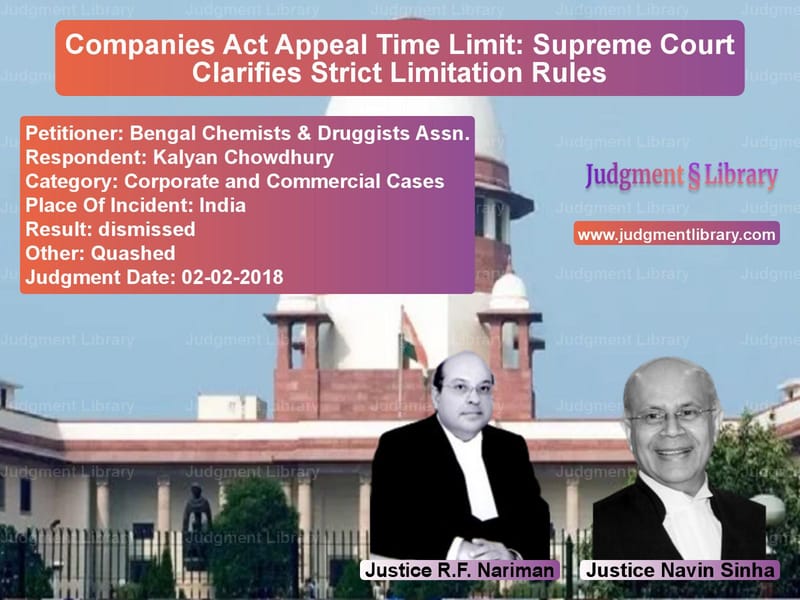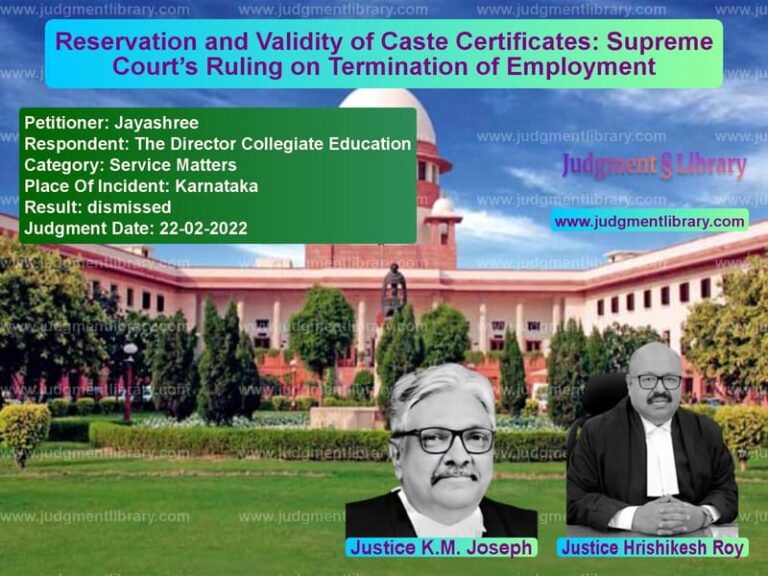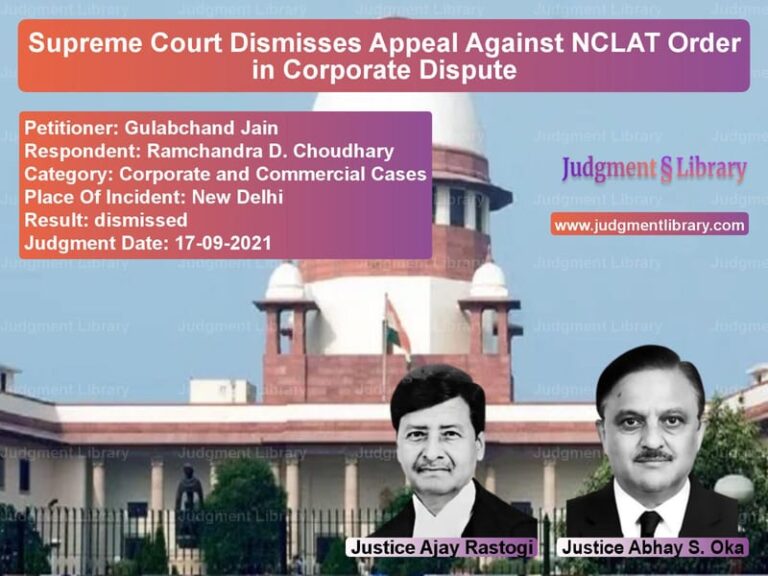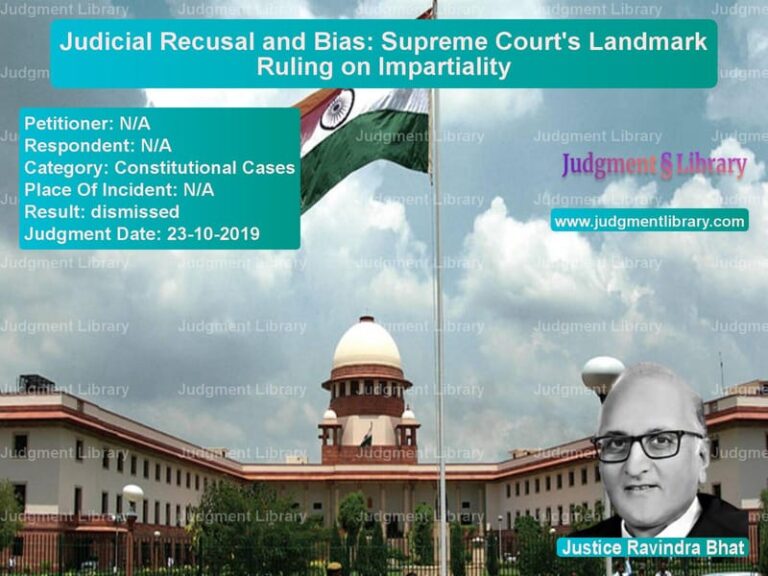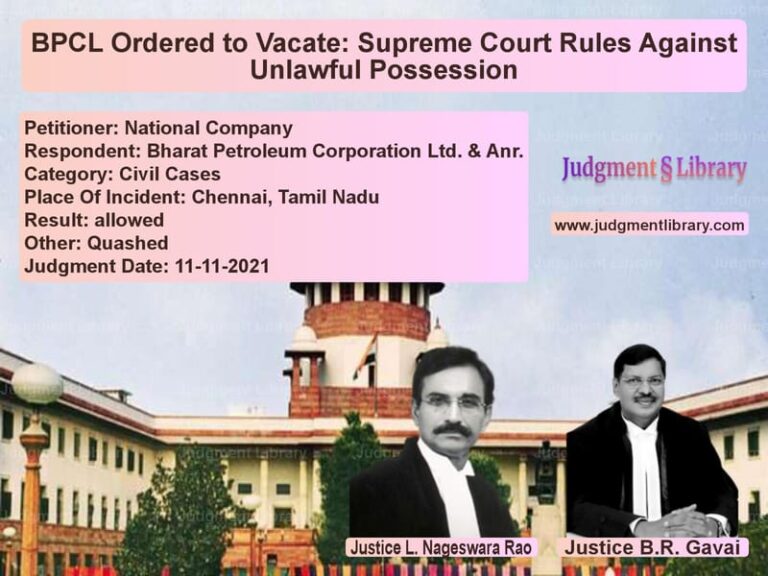Companies Act Appeal Time Limit: Supreme Court Clarifies Strict Limitation Rules
The Supreme Court of India, in its judgment in Bengal Chemists & Druggists Assn. vs. Kalyan Chowdhury, ruled on a crucial issue concerning the limitation period for filing appeals before the National Company Law Appellate Tribunal (NCLAT) under Section 421(3) of the Companies Act, 2013. The case revolved around whether delays beyond the prescribed limitation period could be condoned under Section 5 of the Limitation Act, 1963. The judgment reinforced the principle that statutory limitation periods must be strictly followed unless explicitly stated otherwise in the governing statute.
Background of the Case
The appellant, Bengal Chemists & Druggists Association, had filed an appeal before the NCLAT against an order of the National Company Law Tribunal (NCLT). The appeal was filed 9 days after the expiry of the maximum permissible period under Section 421(3) of the Companies Act, 2013. The NCLAT dismissed the appeal as time-barred, prompting the appellant to challenge the decision before the Supreme Court.
Key Legal Issues Considered
- Whether Section 5 of the Limitation Act, 1963, applies to appeals filed under Section 421(3) of the Companies Act, 2013.
- Whether the limitation period in Section 421(3) is mandatory or directory.
- Whether the NCLAT has the power to condone delays beyond the prescribed period of 90 days.
Arguments Presented
Petitioner’s (Bengal Chemists & Druggists Assn.) Arguments
- Section 421(3) does not contain the phrase “but not thereafter,” unlike Section 34(3) of the Arbitration and Conciliation Act, 1996.
- Section 433 of the Companies Act, 2013, makes the provisions of the Limitation Act, 1963, applicable to appeals before the NCLAT.
- The legislative intent was to allow condonation of delay beyond the prescribed period under Section 5 of the Limitation Act.
Respondent’s (Kalyan Chowdhury) Arguments
- Section 421(3) provides a strict limitation period of 45 days, extendable by another 45 days, and no further extension is permissible.
- The phrase “not exceeding 45 days” in the proviso clearly indicates a legislative intent to restrict condonation beyond this period.
- Allowing condonation beyond 90 days would render the second limitation period meaningless.
Supreme Court’s Observations
The Supreme Court carefully analyzed the language of Section 421(3) and its proviso. It held:
“A cursory reading of Section 421(3) makes it clear that the proviso provides a period of limitation different from that provided in the Limitation Act and also provides a further period not exceeding 45 days only if it is satisfied that the appellant was prevented by sufficient cause from filing the appeal within that period.”
The Court further noted:
“If we were to accept the argument that delay beyond 90 days can be condoned, it would render the outer limit of 90 days meaningless. The second limitation period is peremptory in nature.”
Final Judgment and Directions
- The Supreme Court dismissed the appeal, upholding the NCLAT’s decision.
- It ruled that Section 5 of the Limitation Act does not apply to appeals filed under Section 421(3) of the Companies Act, 2013.
- The Court clarified that the maximum permissible time to file an appeal before the NCLAT is 90 days (45 days + an additional 45 days if sufficient cause is shown).
- After 90 days, the NCLAT has no power to condone further delay.
Implications of the Judgment
This ruling has significant implications for companies, legal practitioners, and litigants involved in corporate disputes. The Supreme Court has reaffirmed that statutory limitation periods in commercial and corporate matters must be adhered to strictly. The judgment ensures:
- Greater certainty and predictability in NCLAT proceedings.
- Elimination of prolonged litigation due to discretionary condonation of delays.
- Increased efficiency in corporate dispute resolution.
Conclusion
The Supreme Court’s judgment in this case underscores the importance of adhering to statutory limitation periods. By disallowing the condonation of delays beyond the maximum prescribed period, the Court has reinforced the need for diligence and timely action in corporate litigation. This ruling will serve as a guiding principle for future cases concerning the interpretation of limitation provisions under corporate laws in India.
Petitioner Name: Bengal Chemists & Druggists Assn.Respondent Name: Kalyan ChowdhuryJudgment By: Justice R.F. Nariman, Justice Navin SinhaJudgment Date: 02-02-2018
Don’t miss out on the full details! Download the complete judgment in PDF format below and gain valuable insights instantly!
Download Judgment: Bengal Chemists & Dr vs Kalyan Chowdhury Supreme Court of India Judgment Dated 02-02-2018.pdf
Direct Downlaod Judgment: Direct downlaod this Judgment
See all petitions in Corporate Compliance
See all petitions in Company Law
See all petitions in unfair trade practices
See all petitions in Judgment by Rohinton Fali Nariman
See all petitions in Judgment by Navin Sinha
See all petitions in dismissed
See all petitions in Quashed
See all petitions in supreme court of India judgments February 2018
See all petitions in 2018 judgments
See all posts in Corporate and Commercial Cases Category
See all allowed petitions in Corporate and Commercial Cases Category
See all Dismissed petitions in Corporate and Commercial Cases Category
See all partially allowed petitions in Corporate and Commercial Cases Category

